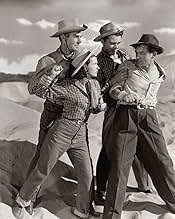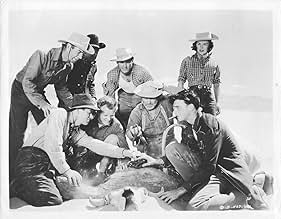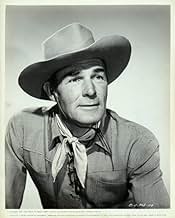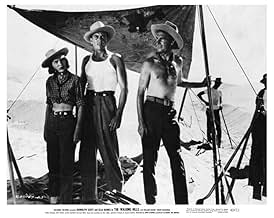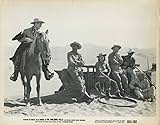NOTE IMDb
6,4/10
1,2 k
MA NOTE
Ajouter une intrigue dans votre langueA group of treasure hunters search for a wagon load of gold, buried years before in Death Valley.A group of treasure hunters search for a wagon load of gold, buried years before in Death Valley.A group of treasure hunters search for a wagon load of gold, buried years before in Death Valley.
Ralph Dunn
- Detective
- (non crédité)
John McKee
- Bronc Handler
- (non crédité)
Frank Merlo
- Bronc Handler
- (non crédité)
Jack Parker
- American Customs Guard
- (non crédité)
Charles Stevens
- Cleve
- (non crédité)
Frank Yaconelli
- Bartender
- (non crédité)
Histoire
Le saviez-vous
- AnecdotesSome regard this as the only "film noir" western, but that would be to disregard 'Pursued' and 'Blood on the Moon', among others.
- GaffesAt the end of the picture, just before Ella Raines rides off, she calls Randolph Scott, "Jeff", only his character's name is "Jim".
- Citations
Chris Jackson: [Referring to the large bandage on her forehead] Yeah, until I went bangin' my puss! Now get lost, will ya?
- Bandes originalesYou Won't Let Me Go
Sung by Josh White
Commentaire à la une
A very rewarding "lust for gold" adventure that tells its story in a brief 78 minutes and is all the better for it. Director John Sturges would later in his career allow some of his films to run overlong (THE GREAT ESCAPE) or blow up what should have been more simply told (GUNFIGHT AT THE OK CORRAL - the depicted gunfight itself is but one example), but earlier in his career made a number of lean, taut treasures, this is one of them.
A group of people are bound together in the search for some wagons believed to have been lost in the desert a century earlier, and the legend has it that gold was on them. When the youngest of them happens to mention something spotted in the desert, the need for secrecy binds the group together lest someone reveal the "golden opportunity." Several in the group have pasts that they are trying to hide and potential futures they are trying to escape if caught. One of them is a detective hot on a fugitive's trail, but willing to set aside duty for his share of the loot.
Randolph Scott headlines as the more or less moral center of the group, even if his intentions and actions seem to defy that description. For a slightly less than "A" feature, the film boasts an admirable cast of characters, among them Ella Raines, John Ireland, Arthur Kennedy, Edgar Buchanan (scene stealing as usual) and blues/folk revivalist singer Josh White whose musical contributions to the film capture a legendary performer for posterity. William Bishop, a young man whom Columbia was grooming for stardom (but who failed to click and would soon "descend" to mostly TV work) is the least familiar perhaps of the major actors, but he's impressive enough here for one to wish he had done better within the ten years that he had left before cancer took him at 41.
An interesting subplot has Scott's mare about to foal - a metaphor for new life or spiritual rebirth being created among the desert ruins. It gives nothing away to reveal that the fugitive surrenders or that some characters realize that gold fever can cause one to suspend principles - the latter is expected in such melodramas. But with its stunning black-and-white cinematography, especially in night scenes and the climatic desert storm, this film is as much of a treasure as that which its protagonists seek. Camera ace Charles Lawton must have impressed Scott and producer Harry Joe Brown as he would do five more films with the pair in the next decade. Highly recommended.
A group of people are bound together in the search for some wagons believed to have been lost in the desert a century earlier, and the legend has it that gold was on them. When the youngest of them happens to mention something spotted in the desert, the need for secrecy binds the group together lest someone reveal the "golden opportunity." Several in the group have pasts that they are trying to hide and potential futures they are trying to escape if caught. One of them is a detective hot on a fugitive's trail, but willing to set aside duty for his share of the loot.
Randolph Scott headlines as the more or less moral center of the group, even if his intentions and actions seem to defy that description. For a slightly less than "A" feature, the film boasts an admirable cast of characters, among them Ella Raines, John Ireland, Arthur Kennedy, Edgar Buchanan (scene stealing as usual) and blues/folk revivalist singer Josh White whose musical contributions to the film capture a legendary performer for posterity. William Bishop, a young man whom Columbia was grooming for stardom (but who failed to click and would soon "descend" to mostly TV work) is the least familiar perhaps of the major actors, but he's impressive enough here for one to wish he had done better within the ten years that he had left before cancer took him at 41.
An interesting subplot has Scott's mare about to foal - a metaphor for new life or spiritual rebirth being created among the desert ruins. It gives nothing away to reveal that the fugitive surrenders or that some characters realize that gold fever can cause one to suspend principles - the latter is expected in such melodramas. But with its stunning black-and-white cinematography, especially in night scenes and the climatic desert storm, this film is as much of a treasure as that which its protagonists seek. Camera ace Charles Lawton must have impressed Scott and producer Harry Joe Brown as he would do five more films with the pair in the next decade. Highly recommended.
Meilleurs choix
Connectez-vous pour évaluer et suivre la liste de favoris afin de recevoir des recommandations personnalisées
- How long is The Walking Hills?Alimenté par Alexa
Détails
- Durée1 heure 18 minutes
- Rapport de forme
- 1.37 : 1
Contribuer à cette page
Suggérer une modification ou ajouter du contenu manquant

Lacune principale
By what name was Les aventuriers du désert (1949) officially released in India in English?
Répondre
